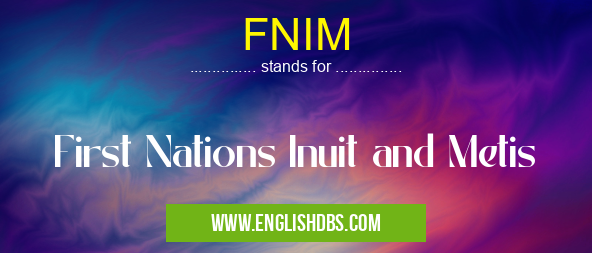What does FNIM mean in UNCLASSIFIED
FNIM is an acronym that stands for First Nations Inuit and Metis. It is a collective term used to refer to the three distinct Indigenous peoples of Canada: First Nations, Inuit, and Métis.

FNIM meaning in Unclassified in Miscellaneous
FNIM mostly used in an acronym Unclassified in Category Miscellaneous that means First Nations Inuit and Metis
Shorthand: FNIM,
Full Form: First Nations Inuit and Metis
For more information of "First Nations Inuit and Metis", see the section below.
FNIM: Full Form and Meaning
- First Nations: The original inhabitants of Canada, with a rich and diverse cultural heritage.
- Inuit: Indigenous people who inhabit the Arctic regions of Canada, Greenland, and Alaska.
- Métis: Descendants of both First Nations and European settlers, with a unique blend of cultures.
Significance of FNIM
FNIM peoples have distinct histories, cultures, languages, and traditions. They have played a vital role in shaping Canada's history and identity. Recognizing their contributions and addressing their ongoing challenges is crucial for reconciliation and an inclusive society.
Essential Questions and Answers on First Nations Inuit and Metis in "MISCELLANEOUS»UNFILED"
What is FNIM?
FNIM stands for First Nations, Inuit, and Métis. These are the three distinct Indigenous peoples of Canada who have their own unique cultures, languages, and traditions.
What is the difference between First Nations, Inuit, and Métis?
First Nations are the descendants of the original inhabitants of North America, who lived in the area now known as Canada before European colonization. Inuit are the Indigenous peoples of the Arctic regions of Canada, Greenland, and Alaska. Métis are people of mixed Indigenous and European ancestry.
What are the rights of FNIM peoples?
FNIM peoples have a number of rights under the Canadian Constitution, including the right to self-government, the right to their traditional lands, and the right to cultural and linguistic preservation.
What is the history of FNIM peoples in Canada?
The history of FNIM peoples in Canada is a long and complex one, marked by both cooperation and conflict with European settlers and the Canadian government. In recent years, there has been a growing movement for reconciliation between FNIM peoples and the rest of Canada.
What are some of the challenges facing FNIM peoples today?
FNIM peoples face a number of challenges today, including poverty, discrimination, and lack of access to education and healthcare. However, there is also a growing movement for Indigenous self-determination and empowerment.
Final Words: The term FNIM encompasses the diversity and resilience of Indigenous peoples in Canada. It serves as a reminder of the importance of recognizing and respecting their unique identities and contributions to the nation. Ongoing efforts to promote reconciliation, address systemic barriers, and foster understanding among all Canadians are essential for a just and equitable society.
